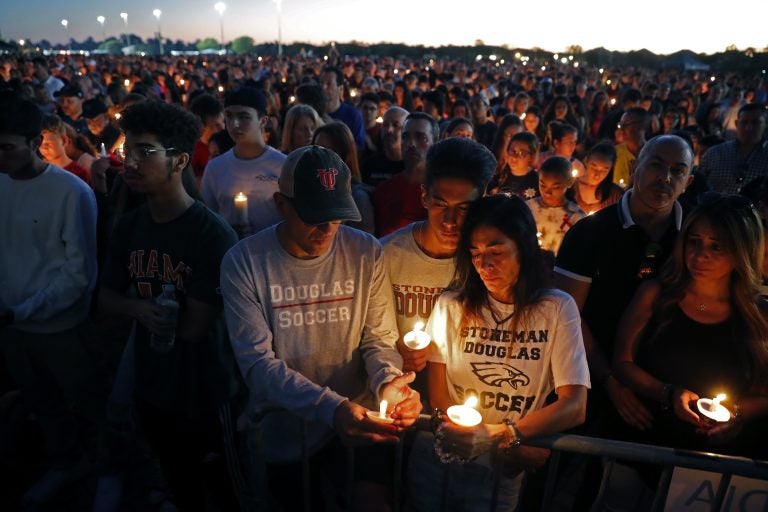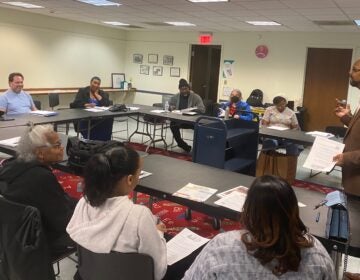Gunshots, again
It’s not rocket science. It’s not even algebra 2. It’s a no-duh equation: Countries with more stringent gun controls clock fewer gun murders.

Jorge Zapata, Jr., center, a student at Marjory Stoneman Douglas High School, holds candles with his mother Lavinia Zapata, and father Jorge Zapata, Sr., during a candlelight vigil for the victims of the Wednesday shooting at the school, in Parkland, Fla., Thursday, Feb. 15, 2018. (Gerald Herbert/AP Photo)
A few weeks ago, a dozen friends came over to swap quarts of homemade soup and play What If.
Here’s how it works: Each person gets an index card and writes a question, any question, beginning with the words “what if.” Someone shuffles the cards and returns one to each player, who writes a response to the question, beginning with the word “then.”
The game concludes with a twisted sort of read-around: One person reads the “what if” question from her card; then the person to her left shares the response that’s jotted on hers.
Every time I’ve played it, this seesawing Q&A makes a weird, beautiful and profound sense:
What if nothing I’m working for comes to pass? Then you might be afraid to go to sleep.
What if you could go anywhere? I’d take a nap and see if the world was there when I woke up.
What if, on Wednesday evening, my 17-year-old daughter had not whispered, as we walked into the restaurant to celebrate Valentine’s Day with her grandmother, “Ama. Fifteen dead. It was a school. Near Fort Lauderdale.” (The death count is now 17.)
My daughter. The one who, the following morning, did not want to leave the nest of her lavender duvet, the one whose bagel I toasted just right, with a corona of brown around the edge, the one to whom I called “I love you” as she clicked down the front steps.
What if I were one of the parents whose stricken face flashed on CNN’s broadcast about this latest school shooting — a parent hugging her child in anguished relief because he is still alive; a parent praying in a hospital waiting room; a parent frozen to the sidewalk while the cop lights spin and spin?
What if we did not log our dead and wounded by the dozen, by the score, by the 20 mass shootings (those in which the gun-wielder kills four or more people indiscriminately in a public place) that have occurred in the United States since 18-year-old Eric Harris and 17-year-old Dylan Klebold killed a dozen students and one teacher at Columbine High School in 1999?
Thursday morning, I ran on the treadmill at the gym while watching five televisions simultaneously. Tears slid down my face as a reporter interviewed two of the surviving teens, one of them a senior whose environmental science class ended abruptly at the pop of a gunshot.
My daughter takes environmental science.
I watched the closed-captioning: the silent, moving faces of the reporters, the kids, the parents. Florida Gov. Rick Scott, leader of a state that boasts some of the most lenient gun legislation in the country. In the Sunshine State, you can buy a gun without a license and, in most cases, skirt a background check — even for the purchase of semi-automatic weapons.
There was President Trump, mouthing his condolences and prayers, followed by a bar graph showing the number of violent deaths per 100,000 people in the United States as well as in 15 other countries. Guess what? We lose — because that tall red stripe (3.7, compared with 0.68 in Italy, 0.5 in Canada and 0.07 in the United Kingdom) is not a win.
I watched the story unfold in its heart-cracking, now-familiar ways: someone calling the shooter “pure evil”; someone else speculating about his mental state; a poll noting that 95 percent of Americans support universal background checks.
To call an expelled-from-school teenager with an AR-15 and a disturbing trail of Instagram posts “pure evil” is to distance that child — and he, too, is someone’s child — from the rest of us, from our own daughters and sons. To call his act “evil” lets us off the hook. Because this horror, the same horror that flared in Sandy Hook and San Bernardino and Orlando and Las Vegas, belongs to all of us.
It’s not rocket science. It’s not even algebra 2. It’s a no-duh equation: Countries with more stringent gun controls clock fewer gun murders.
Why can’t we follow the sane and practical lead of Finland, Australia, or Japan? Why do we allow the U.S. gun lobby to wield so much clout? I say “we” because lawmakers who genuflect at the feet of the NRA, eager to do its legislative bidding, can only do so if they hold elective office. And who determines that? You got it. We, the people.
While I ran and sweated and cried, closed-captioning continued to bleed over those television screens, across the faces and bodies of the living and the wounded, the terrified and the still-in-shock. At one point, when the commentator mentioned “Columbine,” the CC read-out said “column bind.” Another time, it came out as “common blind.”
It made a weird and profound sense. We are blind where trauma is concerned, often not catching it until too late, when we look back and note the muddy tracks: in this case, a young man who lost his birth parents through adoption, then his adoptive parents — most recently, his mother — through death. A kid who was crying out in raw terms, who was suspended because he was found with bullets in his backpack, who brandished knives in his Instagram pictures.
It is our common blindness, a reluctance to note and respond to the early signs of disturbance, a failure to provide enough qualified counselors and school-based mental health services to meet students’ increasingly complex needs.
And it is a binding column, too — the way our society seems stuck in the story of mass shooting followed by a hot second of hand-wringing followed by an aching silence where gun control legislation might be.
What if we decided to change that story? Now. Before the next troubled young man stockpiles automatic weapons under his bed and unleashes his anguish in a rain of bullets. Now. Before the next town mourns its children. What if we had the courage, the pained resolve, the collective political will to stand up to gunmakers and gun lobbyists and the pro-gun legislators whose pockets they line?
I still have the index cards from our game night, with their scribbled juxtapositions. I’m holding onto them: the big questions, the stark, tender answers, the game that only works through a willingness to suspend the common narrative and reach for something strange and new, together.
What if we could read each other’s thoughts? Then I suppose we might have more to fear than we actually do.
What if your dreams could change your past? Then our maps would never curl at the edges.
What if you stopped being afraid?
Then … just imagine.
WHYY is your source for fact-based, in-depth journalism and information. As a nonprofit organization, we rely on financial support from readers like you. Please give today.




